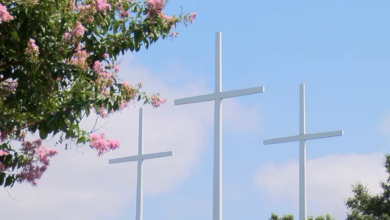Inflation, soaring prices across Middle East dampen Eid celebrations

Cairo, Jul 9 (EFE).- Inflation and rising global prices because of the war in Ukraine have cast a shadow over this year’s Eid al-Adha, leaving many Muslims in the Middle East unable to afford a lamb or any meat to mark the Feast of Sacrifice.
The holiday, the most important in the Islamic calendar, commemorates how the prophet Abraham offered his firstborn son to God.
In some Middle Eastern countries, especially those dependent on meat imports, people are suffering the consequences of an economic crisis that has been dragging on since the start of the pandemic in 2020 and has dampened the festive spirit normally associated with this time of year.
“We could not afford it, we came just to have a look and take photos with the sheep,” Ghaleb al-Dhamari, a 40-year-old Yemeni tells Efe at Sanaa’s main livestock market.
“Prices are very high, I can’t pay 90,000 Yemeni riyals (around $150) for the sheep,” he laments while touring the market with his wife and three children.
In Egypt, a collapse of the local currency has added to many people’s woes, including Mohamed Said Rashad, 40, who has volunteered at a charity association to distribute meat among poor people.
This year “participation has dropped significantly” because “there are many difficulties due to the commitments that (people) have in life and their current situation,” the owner of a Cairo photo studio tells Efe.
“This year, with the notable increase in prices, I was only able to participate in the sacrifice of a lamb, which is going to affect the share of the poor, and what will be left for the family as well,” he says.
The price of a kilo of lamb jumped from 60 to 70 Egyptian pounds ($3-4) to between 80 and 105 (between $4.20 and 5.50), butcher Mohamed al-Wageh tells Efe, adding that this Eid’s sales have fallen by 20%.
Sitting in front of his clothing store in Beirut, Ali explains to Efe that visiting his uncles, giving sweets to loved ones and occasionally killing a goat are now things of the past.
“We don’t have the spirit of Eid due to the situation,” he says. “Thank God, at least we have our health”.
Nearly 80% of people live in poverty due to a crippling economic crisis that began at the end of 2019 in Lebanon, where prices are steadily rising, staple products such as fuel are scarce and the local currency has lost more than 90% of its value.
In Baghdad, Mohamed a- Tamimi, a cattle vendor, says that the rise in lamb prices – which this year is between 150 and 550 dollars – has severely affected his business.
The rise in prices is due to “the lack of government supervision” and the speculation of sellers, while he also blames “the drought that hit Iraq hard and caused a significant reduction in the number of cattle this year”.
Raad Shaker, 45, tells Efe from the market that he and his wife had intended to sacrifice two lambs for this Eid, but were surprised by the exorbitant prices.
“That forced us to recalculate and make the decision to buy just one lamb, which cost us 350,000 Iraqi dinars (about $239). It is too high a price for many people,” he says. EFE
ja-hu-njd-sy-cgs/ta/ks




